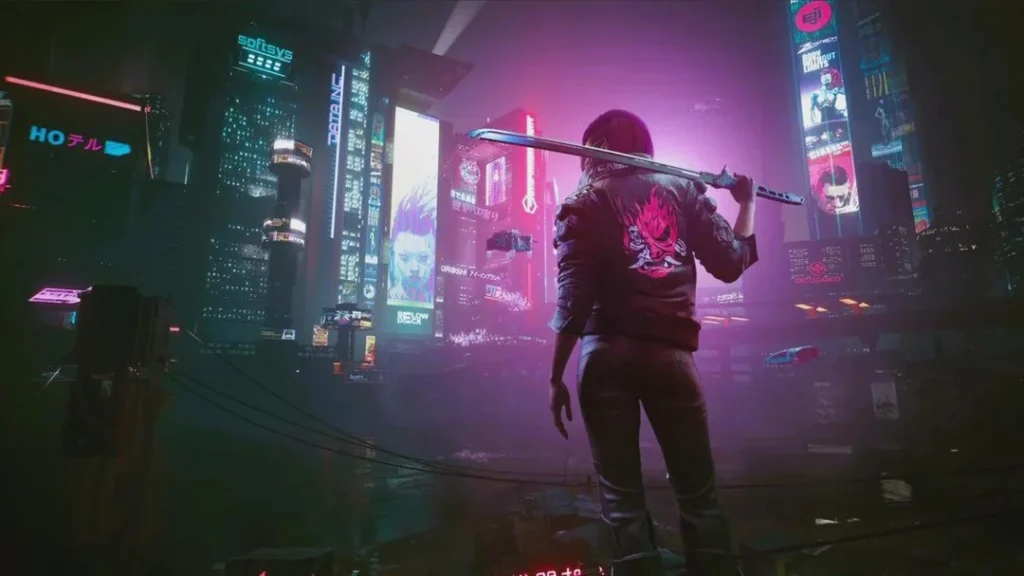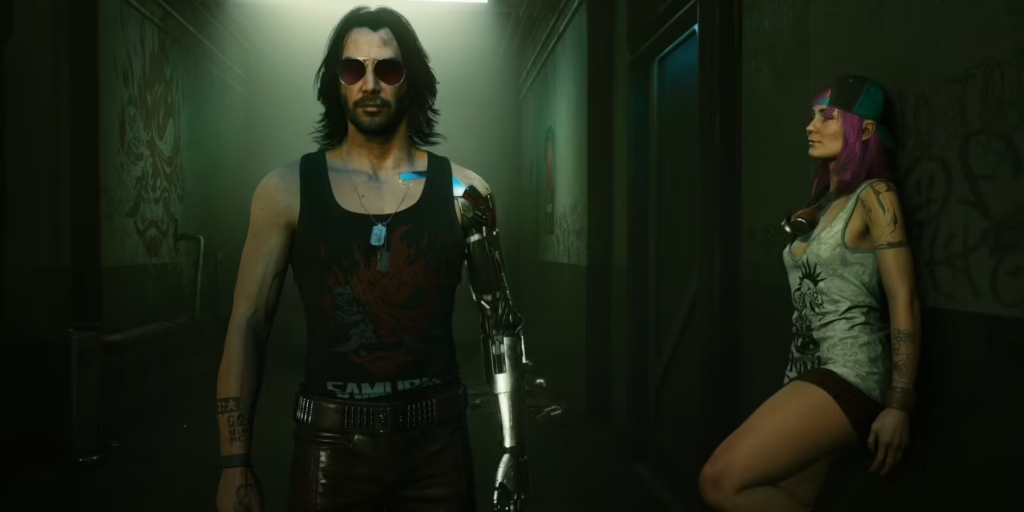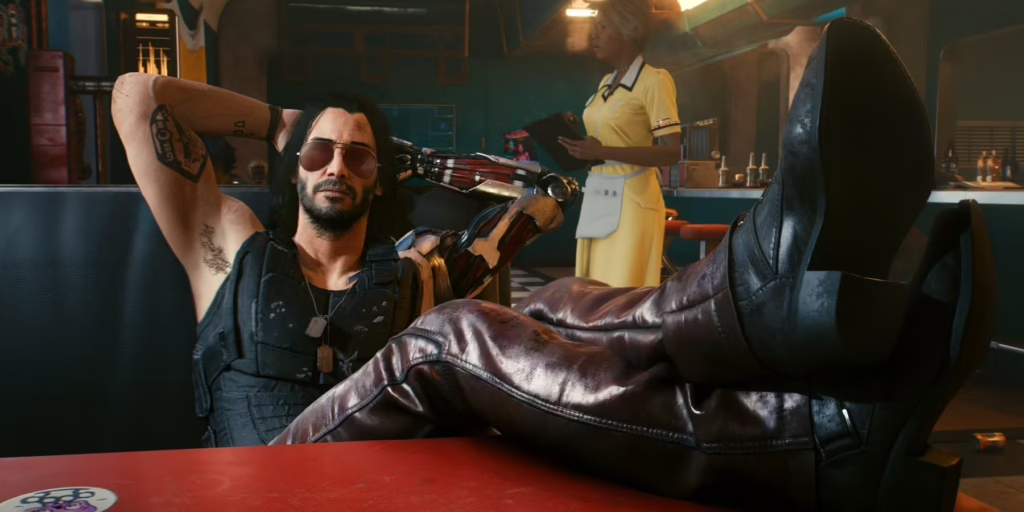


Cyberpunk 2077 and the Romanticization of Dystopia – A Reflection of Our World
When Cyberpunk 2077 was announced, it felt like a promise – a sprawling, high-tech playground where players could lose themselves in the underbelly of a futuristic megalopolis. From the neon-drenched streets of Night City to the grim realities of corporate sabotage, the game embodied everything we love (and fear) about the cyberpunk genre.
Yet, beneath the glowing neon lights and chrome augments lies something far more familiar – our present reality, reflected back at us. Cyberpunk 2077 isn’t just a thrilling dive into a fictional future; it’s a prophetic vision of where we might be headed if the technological and societal trends of today continue unchecked.
At the same time, we romanticize that future. Cyberpunk’s once-cautionary tales have been transformed into aspiration, with their aesthetic becoming a cultural touchstone, influencing fashion, technology, and entertainment. We find ourselves longing for the very dystopia the genre tried to warn us about.
Why do we romanticize cyberpunk worlds, and what does that say about the state of our society today? Let’s break down the parallels between the world of Cyberpunk 2077 and our current reality – from corporate dominance and wealth disparity to surveillance, body augmentation, and the collapse of traditional societal structures.
Corporate Overreach – When Corporations Rule the World
In Cyberpunk 2077, the world is dominated by megacorporations like Arasaka, Militech, and Kang Tao. These entities control not only the economy but also military forces, security networks, and political systems. Governments are little more than relics, powerless against the corporate empires that have assumed full control.
Sound familiar?
We might not live in Night City, but the increasing influence of tech giants and multinational corporations is undeniable.
- Amazon, Google, Meta, Apple, and Microsoft collectively wield more economic and political power than some nations. In 2023, their combined market value surpassed $7 trillion, outpacing the GDP of most countries.
- Corporate lobbying and political donations influence policy decisions, often prioritizing profit over public welfare.
- Data monopolies give corporations more insight into people’s lives than governments, with platforms like Facebook (Meta) and Google tracking user behavior at an unprecedented scale.
In many ways, we’re already living in a prototypical cyberpunk dystopia, where corporations dictate the flow of information, control infrastructure, and shape legislation. The world of Cyberpunk 2077 simply magnifies this reality.
The dangerous beauty of this setting lies in how stylish it appears.
- Massive skyscrapers with glowing logos.
- High-tech boardrooms protected by corporate armies.
- CEOs who double as shadow rulers.
While this may seem alluring, the human cost – the exploitation of labor, the erosion of public institutions – is often glossed over by the very aesthetic that captivates us.
Wealth Disparity – The Divide Between the Rich and the Rest
In Night City, wealth disparity is visually striking. The elite live in luxurious high-rises while the poor are crammed into overcrowded megabuildings or slums controlled by gangs. Cybernetic enhancements and premium medical care are available – but only to those who can afford it.
Unfortunately, this divide mirrors our reality.
- The world’s top 1% controls more wealth than the bottom 50% combined.
- Billionaires grew richer during the COVID-19 pandemic, while millions faced job insecurity and eviction.
- Urban centers like San Francisco and New York reflect this disparity with wealthy tech hubs bordering homeless encampments.
The illicit cyberware market in Cyberpunk 2077 mirrors the way people in real life juggle multiple jobs or risk going into debt just to afford basic healthcare. It’s a world where survival becomes a luxury, and technological advancement only benefits the privileged few.
Despite this, cyberpunk’s visual language makes even the grimiest streets feel vivid and alive. We fantasize about being part of this world, even if the odds are stacked against us, because the chaos of Night City feels more authentic than the sterile monotony of modern life.
The Gig Economy and Mercenary Work
V, the protagonist of Cyberpunk 2077, isn’t a chosen one or a noble hero. V is a mercenary – a gig worker hustling for survival. Whether it’s hacking, bounty hunting, or running errands for fixers, every job is temporary.
This reflects the rise of freelancing and platform-based labor in today’s economy.
- Over 36% of the global workforce operates within the gig economy.
- Delivery drivers, rideshare operators, and freelancers often juggle multiple contracts, just like V juggles side gigs in Night City.
- Job insecurity and lack of benefits mirror the struggles of cyberpunk’s mercenary lifestyle – where you’re only as valuable as your last job.
In both worlds, stability is fleeting. But the allure of living on the edge, working for yourself, and defying traditional employment keeps people hooked on the fantasy of freedom.
Surveillance – The Death of Privacy
Night City is drowning in surveillance. Cameras, drones, and data-mining operations track every move. Privacy doesn’t exist. In Cyberpunk 2077, hacking these systems becomes essential for survival.
In real life, we’re not far behind.
- Facial recognition software is used globally.
- Social media platforms harvest vast amounts of personal data.
- Governments justify mass surveillance in the name of national security.
Yet, as concerning as it is, cyberpunk’s aesthetic makes surveillance look enticing. A Netrunner hacking into a city grid or wearing augmented lenses feels empowering, even if the very existence of these systems signifies oppression.
Transhumanism and the Body as Canvas
In Cyberpunk 2077, cybernetic implants are more than upgrades – they’re status symbols, survival tools, and weapons. Augmenting the body blurs the line between human and machine.
This fascination with transhumanism is already gaining traction.
- Bionic limbs are becoming more advanced.
- Brain-machine interfaces like Neuralink are in development.
- Biohacking communities explore implanting RFID chips or LED lights under their skin.
The cyberpunk fantasy isn’t just about surviving oppression – it’s about transcending human limitations.
Conclusion – A Future We Crave
Cyberpunk worlds, including Cyberpunk 2077, started as cautionary tales – warnings about technological obsession, corporate dominance, and wealth disparity. Yet today, they are fashion statements, cultural touchstones, and fantasies we eagerly consume.
The allure of neon lights, cybernetic enhancements, and rebellious anti-heroes seduces us, making the dystopia feel exciting rather than bleak.
But as we immerse ourselves in these worlds, we must remember:
Cyberpunk isn’t just entertainment – it’s a reflection of the world we’re already building.
